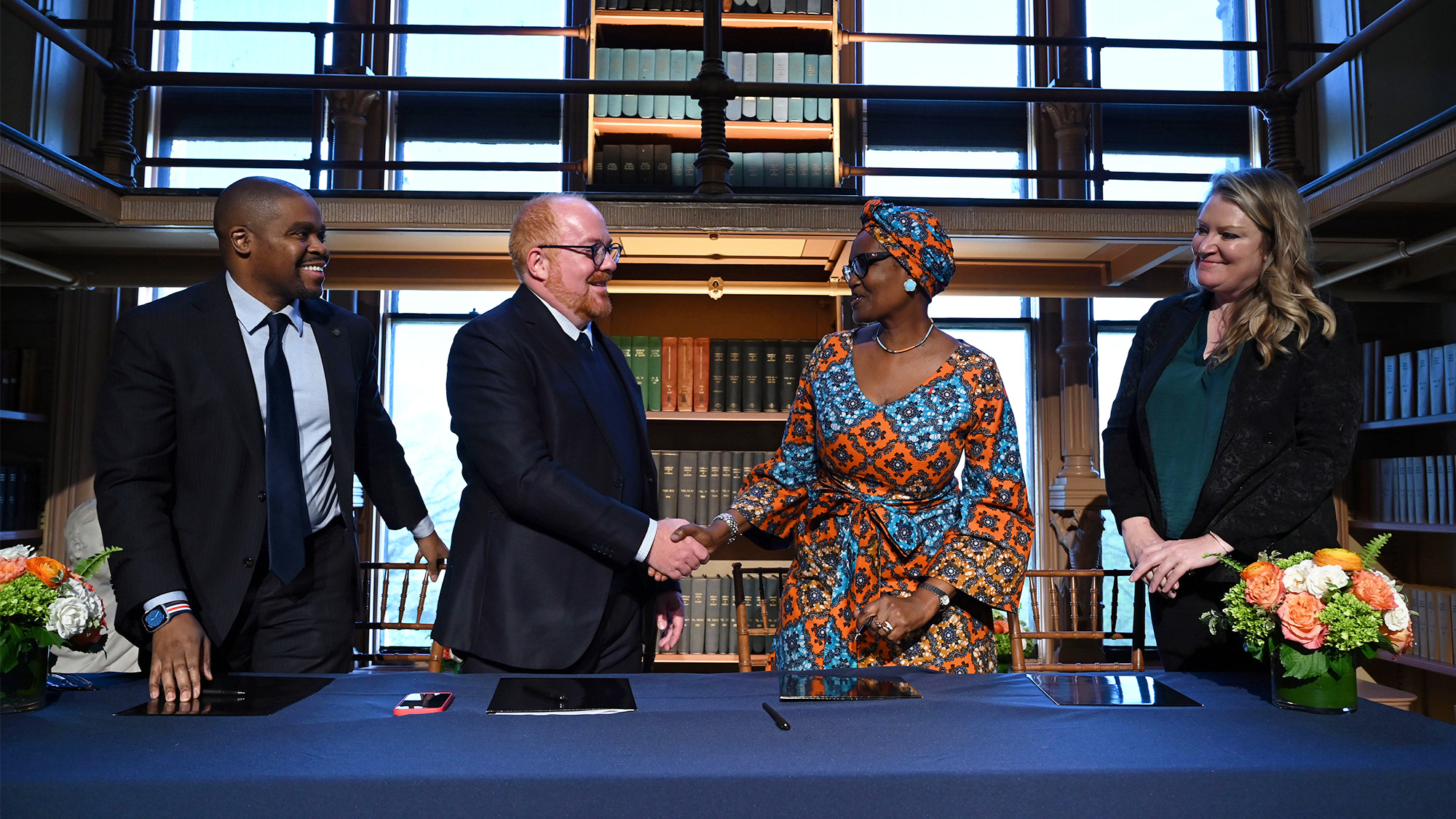New UNAIDS Collaborating Center at Georgetown Leverages Strengths in HIV/AIDS Law, Policy, and Politics
Image Caption: The agreement formalizing UNAIDS Collaborating Center was signed April 12 at Georgetown by (l to r) Christopher King, dean of the School of Health; Matthew Kavanaugh, director of the Global Health Policy and Politics Initiative and assistant professor in the School of Health; Winnie Byanyima, Executive Director, UNAIDS and United Nations Under-Secretary-General; and Katie Gottschalk, executive director of the O’Neill Institute.
Media Contact
Karen Teber, km463@georgetown.edu
WASHINGTON (April 12, 2023) — The Joint United Nations Programme on HIV/AIDS (UNAIDS) today designated the Global Health Policy and Politics Initiative at Georgetown as a United Nations Collaborating Center to support and advance policy and laws impacting HIV/AIDS with the overarching goal of addressing the inequalities driving the pandemic.
Bridging the Georgetown School of Health and the O’Neill Institute for National & Global Health Law, the Global Health Policy and Politics Initiative leverages scholarship and technical strengths of policy and law experts embedded across Georgetown University. Matthew Kavanagh, PhD, director of the Global Health Policy and Politics Initiative at the O’Neill Institute and assistant professor of global health in the School of Health, will spearhead the Collaborating Center.
“Legal and political forces continue to shape not only AIDS, but all of the pandemics of our time. With Prof. Kavanagh’s leadership, this new Collaborating Center relationship will help build on the work he did at UNAIDS over the last year and a half and deepen our joint efforts to build the law and policy environment needed to end AIDS,” said UNAIDS Executive Director Winnie Byanyima during a visit to Georgetown on April 12.
From September 2021 to January 2023, Kavanagh served as UNAIDS’ interim deputy executive director and special advisor to Byanyima in creating a new policy, advocacy, and knowledge branch at UNAIDS. Kavanagh stood up the structures to achieve the ambitious new Global AIDS Strategy focused on closing the inequalities underlying the continuing AIDS pandemic.
“As a Collaborating Center, we look forward to working alongside United Nations colleagues from across the Joint Programme to explore more deeply the political determinants of health and help inform the development of laws and policies that can help end the HIV/AIDS pandemic and build resilience for future pandemics,” said Kavanagh. “Alongside my global health colleagues at the O’Neill Institute, School of Health, and through Georgetown’s Global Health Institute, we will be able to amplify our collective work to further advance the effective use of law and policy in response to global public health challenges, including HIV.”
Work of the Global Health Policy & Politics Initiative includes the HIV Policy Lab, a collaborative effort between Georgetown University, UNAIDS, and the Global Network of People Living with HIV, to document, track, and ultimately improve HIV-related policy environments around the world, as well as work on community-led monitoring and social science research on the political determinants of health. It was founded at the O’Neill Institute, one of the world’s premier health law and policy institutes that believes that the law is a fundamental tool for solving critical health problems around the world.
“We are thrilled to partner with UNAIDS to launch this innovative Collaborating Center,” said Lawrence O. Gostin, JD, faculty director of the O’Neill Institute, which is also a designated WHO Collaborating Center. “For the past 15 years, the O’Neill Institute’s mission has been to fight for health and justice by advancing laws and policies to tackle critical health challenges worldwide. AIDS changed the world and showed the power of social mobilization. Under the extraordinary leadership of Matt Kavanagh, and working with the School of Health, the Center will make a major impact on global public health and justice. I’m proud we are working in deep partnership with UNAIDS.”
“This collaboration reflects our commitment to health equity and presents new interdisciplinary opportunities for students and faculty to advance knowledge and inform policy at the nexus of inequality, law, policy, and HIV,” said Christopher J. King, PhD, dean of the School of Health, a home for scholars and students to work collaboratively across disciplines to address human health and wellbeing from various perspectives. “We are also fortunate to work alongside dedicated faculty members in Georgetown’s Global Health Institute who bring to bear significant scholarship and technical strengths in many aspects of work to eliminate HIV/AIDS.” The agreement establishing the Collaborating Center, signed earlier today, provides a framework for inter-institutional dialogue and cooperation. In the coming months, the institutions will work to stand up a set of inequality-focused activities, develop formal, regular bilateral consultative meetings, and collaborate on sharing data and political analysis in the years ahead.

